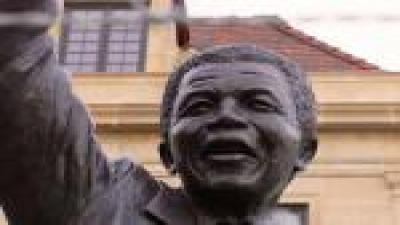The news flash appeared on my iPhone: Nelson Mandela—”Madiba”—has died. I tossed what I had been working on and turned my attention to the one who took history in his hands, and through his long walk to freedom, helped to “bend the arc of the moral universe toward justice.” Upon being released from prison, much of it at remote Robben Island, 4 miles off the coast of Capetown, Mandela proclaimed himself a servant of the people of South Africa, and placed his life into their hands with a steely resolve to create a Rainbow Nation grounded in “peace, democracy and freedom for all.”

Nelson Mandela died December 5 at age 95. (Photo: Ted Eytan/Flickr/Creative Commons) |
Six weeks ago I had the privilege of having dinner in the Old Refectory at Yale Divinity School with the former U.S. Ambassador to South Africa, James Joseph and his wife Mary Braxton, on the occasion of Ambassador Joseph receiving YDS’s Lux et Veritas Award. The award is given to a graduate who has demonstrated excellence and distinction in “applying the compassion of Christ to the diverse needs of the human condition.” He holds the distinction of being the only US ambassador to present his credentials to President Nelson Mandela. James Joseph, graduate of YDS’s class of 1963, is likely the singular U.S. official who worked most closely and most directly with President Mandela during his only term as leader of the new South Africa.
In September 2006, at the Clinton School of Public Service at the University of Arkansas, Ambassador Joseph delivered a speech entitled, “The Lessons of Mandela.” Listen to the words of this student of theology—ordained minister, civil rights activist, business leader, philanthropist, and advisor to four U.S. presidents—as he describes what Madiba taught him.
Ambassador Joseph first says that Nelson Mandela was a prototype of “soft power.” In political terms, hard power is the ability “to get others to do what we want” while soft power is the ability “to get others to want what we do.” The former is leadership by coercion, the latter by attraction. The attraction of this former herd boy from Mvezo was the firm and gentle beauty of his principles which captured the hearts and minds of people from all walks of life, all corners of the globe, and of all races and complexions. Joseph maintains that one reason for this is that Mandela was grounded in Ubuntu, the principle of community exemplified by the Xhosa proverb, “People are people through other people.”
The second thing the Ambassador learned from Mandela was that he was a reconciler who believed that most conflicts can be solved by “brains rather than blood.” Reconciliation is the principal public value in a global village that is at once both coming together and breaking apart. Joseph observes that whereas discussions of values in the U.S. tend to focus on the “micro-ethics of individual behavior,” Mandela’s larger concern was with the “macro-ethics of institutions and governmental systems.” And in these domains, reconciliation is a cardinal value.
The third lesson was Mandela’s belief in the importance of working with and through others, including—and especially—multilateral organizations such as the United Nations, the Non-Aligned Movement, the Organization of African Unity and the Southern African Development Community. Yet Ambassador Joseph observes that Mandela’s style of leadership also illustrated an important distinction between “hierarchical” multilateralism, which is driven by power in service to national interest, and “egalitarian” multilateralism, which is guided by principle in service to international partnership and collaboration.
Fourth, Mandela taught Ambassador Joseph about the proper way to exercise economic diplomacy. He believed that “markets were good for democracy and democracy good for markets,” but he also endeavored to assure that economic growth contributed to the empowerment of those on the margins. As vigorously as Mandela sought investors in South Africa’s economy, he also demanded them to demonstrate what social good would come from their economic activity.
Finally, and perhaps most importantly, through his diplomatic service Yale Divinity School’s James Joseph learned from Nelson Mandela what it means to be a transformative moral leader in international affairs. Mandela appealed to the better nature and more noble instincts of human nature. He connected with people, including his enemies. He did not harbor bitterness. He endeavored mightily to change his adversaries, while respecting their humanity. And he remained committed to a form of reconciliation—which includes confession, apology and restitution as much as healing and forgiveness—as both “a public value and a public process.”
May Madiba rest in peace.
>Watch the full speech given by former U.S. Ambassador and YDS graduate James Joseph
| Attachment | Size |
|---|---|
| 4.1 KB |